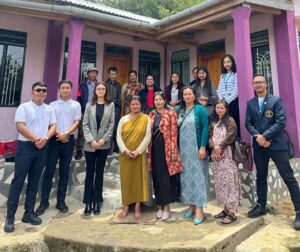Mawbeh, Laitkroh Block – Among the many households visited during the HDLP field engagement, one home stood out—not for its challenges, but for the example it sets in how public schemes, personal commitment, and quiet resilience can together transform a family’s future.
Sngewbha Khongwar, a 38-year-old graduate and mother of four, has built a home—not just of bricks and mortar under the PMAY-G scheme, but of dignity, care, and vision for her children. Her husband, a daily wage earner, was away during the visit, but Sngewbha’s steady leadership and involvement in every aspect of her children’s growth was deeply evident.
All four of her children are enrolled in school, fully vaccinated, and beneficiaries of services at the local ICDS centre, where they receive early learning support and supplementary nutrition. Every child in the family was delivered in a health institution, with Sngewbha ensuring full antenatal and postnatal care at each stage. The household has Aadhaar coverage, enabling them to access a range of entitlements seamlessly.

Despite the economic pressures of rural life, Sngewbha remains determined that none of her children will drop out. She tutors them at home, reinforcing lessons and guiding them through their studies, in addition to managing the household. She is also a member of a Self-Help Group (SHG) and has used group funds to buy school books for her children—an investment in their future she holds above all else.
During the visit, she raised a simple but critical concern: the lack of a door on the girls’ toilet in her daughter’s school. It was a telling reminder of how even small infrastructure gaps can affect girls’ comfort and dignity. The Block Mission Coordinator assured her the matter would be addressed—an example of how community voices must be heard and acted upon.
While her educational background could allow her to offer tuition to other children, Sngewbha explained that she has chosen instead to dedicate her time to her own children’s learning. Her choice highlights both the unseen labour of caregiving and the strength of maternal agency in shaping a better future.
Sngewbha Khongwar’s household exemplifies how an informed and empowered mother can become the axis of change—leveraging schemes, advocating for her children, and quietly ensuring that education, health, and dignity remain central to daily life.
In a block where many families face barriers to services and school dropouts remain a concern, Sngewbha’s story is not just inspiring—it is instructional.